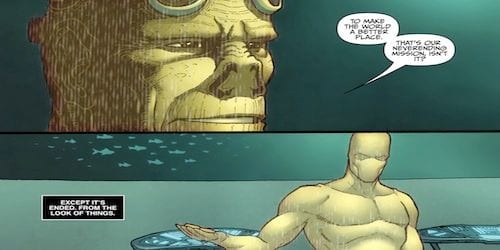
Halcyon is a gem, and don’t let anyone tell you otherwise. It’s probably one of the best hidden treasures to come out of the last 18 months of comics publication. And although it has been a reductionist, penny-pinching economy — which has shifted the Top Two’s focus back towards core properties — it’s hard to remember a time indie comics have had it better.
To wit, Halcyon goes up against such indie titles as Nathan Edmondson’s Who Is Jake Ellis?, Michael Alan Nelson’s Insurrection V3.6, Ben McCool’s Memoir, Charles Burns’ X’ed, Nick Spenser’s Infinite Vacation, Brian Wood’s New York Five (sequel to his critically acclaimed New York Four)… It’s been quite a list.
But writer Marc Guggenheim’s Halcyon stands out on its own merits. The series begins with a curious premise. What if, in a world populated with superheroes, crime suddenly begins to drop?
At first it seems altogether too good to be true. A genuine world peace? Members of the superhero team Halcyon become a narrative device for exploring a range of reactions. Zenith, the “world’s greatest hero”, is given to denial at first. Enos, “cybernetically-enhanced space chimp”, becomes a staunch defender of this new Global Humanitarian Phenomenon. Jarhead, the “super-soldier” carefully monitors the build-up of military forces around the world. And Sabre “urban vigilante”, suspects a crime so massive no one has noticed. Really, it’s only Transom the “super speedster” that finds it’s business as usual, as he circuits the globe rescuing ordinary people from accidents and natural disasters.
It’s interesting to see a writer have the courage to blatantly model his characters on existing superhero prototypes. Jarhead is recognizably Captain America. Sabre similarly, is very clearly Batman. Transom, the Flash. And although female, Zenith is clearly Superman. In an industry where new superheroes are proactively being made distinct from older templates (think of DC’s upcoming wide-scale reboot of all its mainstream titles), it is very much a small but definitive act of courage to tap the readily recognizable. These genre are after all, recognizable for a reason.
What’s also striking about Guggenheim’s writing is its pacing. The story unfolds at a steady, meticulous pace. There’s ethical fallout here, as well as sociological. And of course there’s the superhero genre ‘procedural’ of Sabre chasing down leads to prove that this is a hoax, or worse… a conspiracy.
And of course it isn’t. The first issues of this five-part limited series offer no evidence for Sabre’s suspicions. The focus is entirely on the quickly-evolving global situation. Could this really be true? Could this really be a lasting world peace? It certainly seems to be the case as even Oculus, the world’s greatest supervillain, hands himself over to stand trial at the International Criminal Court in the Netherlands.
This gives these first issues a strange, surreally meditative tone. Superheroes begin to retire, as the old paradigm of good-versus-evil is simply obliterated. This allows Guggenheim to examine at depth the underpinnings of the superhero genre. In fighting a ‘never-ending battle’ against crime, isn’t the figure of the superhero somehow tragic? Somehow overly reactionary and also anachronistic?
Even the book’s title and the name of this world’s super-team, “Halcyon”, seems to suggest the figure of the superhero as dated, trying to recapture a lost glory that perhaps has no more place in the world. But of course Sabre was right all along. And by the third issue we discover there was a conspiracy as Sabre begins to track to the missing Psiclops, the world’s foremost psychic.
It turns out that Oculus was behind the Global Humanitarian Phenomenon all along. He’s finally defeated Halcyon by rendering them irrelevant. But it’s what happens after we discover this nugget that makes Halcyon stand out. And it’s Sabre’s character arc that truly worth the full-ticket price. I won’t play the spoiler card here, but I honestly feel like I should pay more for these issues than I already have.
As a work of fiction, Halcyon traces out that global-event, multi-character drama trope that in recent memory could probably trace its origins back to the phenomenal Lost. It’s the same territory as 2009/2010’s FlashForward and the same season’s reimagining of V. But it’s handled much, much more capably than either of those.
And more like Lost than either of the other shows, Halcyon offers deep philosophical wrestlings as well. Primarily the nature of compassion and the value of a Utopia is explored in much the same way as it is in Jeremy Rifkin’s the Emphatic Civilization. (Triumph’s suicide inter-cut with Sabre reaching a peak in his investigation is just heartrending).
The real tinge of sadness here is, after the sober and mature work that is Halcyon, having to watch the recent popcornucopia that is Green Lantern. Why has Marc Guggenheim’s talent (in his role as scriptwriter) not shone through as clearly as it does in his solo work?

![Call for Papers: All Things Reconsidered [MUSIC] May-August 2024](https://www.popmatters.com/wp-content/uploads/2024/04/all-things-reconsidered-call-music-may-2024-720x380.jpg)



